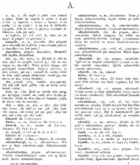Kashubian language
| Kashubian | ||
|---|---|---|
| Kaszëbsczi | ||
| Spoken in | ||
| Region | Pomerania | |
| Total speakers | 50,000 | |
| Language family | Indo-European
|
|
| Official status | ||
| Official language in | In official use, as a regional language, in some communes of Pomeranian Voivodeship, Poland | |
| Regulated by | No official regulation | |
| Language codes | ||
| ISO 639-1 | None | |
| ISO 639-2 | csb | |
| ISO 639-3 | csb | |
| Linguasphere | ||
| Note: This page may contain IPA phonetic symbols in Unicode. | ||
Kashubian or Cassubian (Kashubian: kaszëbsczi jãzëk, pòmòrsczi jãzëk, kaszëbskò-słowińskô mòwa; Polish: język kaszubski) is one of the Lechitic languages, a subgroup of the Slavic languages.
Kashubian is assumed to have evolved from the language spoken by some tribes of Pomeranians called Kashubians, in the region of Pomerania, on the southern coast of the Baltic Sea between the Vistula and Oder rivers.
It is closely related to Slovincian, and both of them are dialects of Pomeranian. Until recently many linguists considered it a divergent dialect of Polish, although now it is recognized as the closest living relative of Polish, being the only other Lechitic language still spoken.
Similarly to Polish, Kashubian includes numerous loanwords from Low German, such as kùńszt (art), and some from German. Other sources of loanwords include the Baltic languages, Russian and Polish. In dialects of Kashubian a schwa occurs.
The first printed documents in Kashubian date from the end of the 16th century. The modern orthography was first proposed in 1879.
In the 2002 census, 53,000 people in Poland declared that they mainly use Kashubian at home. All Kashubian speakers are also fluent in Polish. A number of schools in Poland teach in Kashubian as a lecture language. It is used as an official alternative language for local administration purposes in Gmina Sierakowice and Gmina Parchowo in Pomeranian Voivodeship. Kashubian is also spoken by Kashubians living in Canada.
Important for Kashubian literature was Xazeczka dlo Kaszebov by doctor Florian Ceynowa (1817–1881). Hieronim Derdowski (1852-1902 in Winona, Minnesota) was another important author who wrote in Kashubian, as did doctor Aleksander Majkowski (1876–1938) from Kościerzyna. Jan Trepczyk was a poet of the language. Kashubian poet is Stanisław Pestka too. There is Kashubian literature translated into Polish, English, German, Belarusian, Slovak, Finnish.
Following the collapse of communism in Poland, attitudes on the status of Kashubian have been gradually changing. It is increasingly seen as a fully-fledged language, as it is taught in state schools and has some limited usage on public radio and television. Since 2005 Kashubian has enjoyed legal protection in Poland as an official regional language. It is the only language in Poland with this status. Such status was granted by an act Polish Parliament on January 6 of the same year. The bill passed by the Polish parliament in 2005 provides for its use in official contexts in ten communes where Kashubian speakers constitute at least 20 percent of the population.
Contents |
Gallery
 Bilingual sign in Polish and Kashubian in Pogórze, Puck County, Poland, on road from Gdynia to Rewa |
 Page of Stefan Ramult Pomeranian (Kashubian language) Dictionary 1893 |
 Song: "Kaszubskie nuty" |
See also
- Gdańsk Pomerania
- Kashubian alphabet
- Kashubian-Pomeranian Association
- Old Prussian language
- Pomerelia
- Pomeranian language
References
- Friedhelm Hinze, Wörterbuch und Lautlehre der deutschen Lehnwörter im Pomoranischen (Kaschubischen), Berlin 1965
- Friedrich Lorentz, Geschichte der Pomoranischen (Kaschubischen) Sprache, Berlin and Leipzig, 1925
- Stefan Ramułt, Słownik języka pomorskiego, czyli kaszubskiego, Kraków, 1893 i.e. "Dictionary of the Pomeranian (Seacoast) or Kashubian language" (Cracow, 1893)
- Stefan Ramułt, Słownik języka pomorskiego czyli kaszubskiego. Scalił i znormalizował Jerzy Treder, Gdańsk, 2003
- C. F. i F. N. Voegelin, Classification and Index of the World's Languages. Elsevier, New York 1977
External links
- Omniglot
- Cassubia Slavica
- Wejherowo Land
- Following the trail of manor houses and castles of the Northern Kashubian Region
- Northern Kashubia Heritage
- Kashubian resources; include phrasebooks
|
||||||||||||||||||||